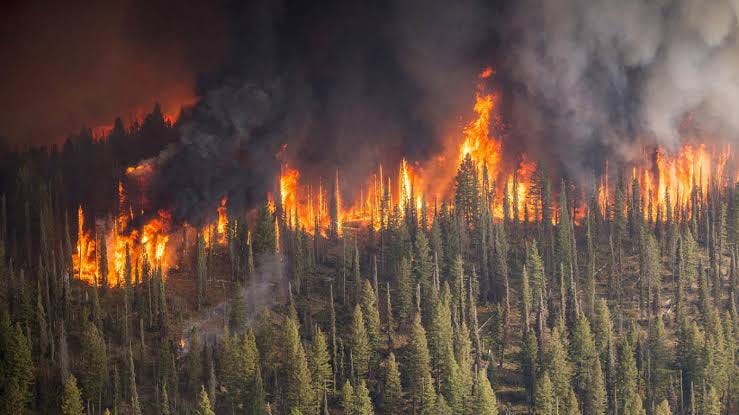Forest Fires, Terrific Temperatures, Burning Buildings: the world reels from Climate Change
The meaning of the present heatwaves is unmistakable
Fires in Russia, Credit, Moscow Times
Recently, temperatures rose above 40 degrees Celsius in Bangladesh, a day marking the hottest in Dhaka for 58 years, just as high temperatures took place in Myanmar, with the north-east city of Yangon reaching an all-time high of 42 degrees Celsius, while authorities in Thailand advised residents of Bangkok to stay at home, temperatures having hit 42 degrees Celsius.
Hundreds of kilometers away, the same scenario played out in Spain, when temperatures hit 38.8 degrees Celsius in Cordoba airport in the south, with the hottest-ever April temperatures, just as high temperatures took place in Portugal, with Mora in the center of the country recording its highest April figures of 36.9 degrees Celsius, while citizens of Morocco suffocated, temperatures having hit a record 41.3 degrees Celsius.
Hundreds of kilometers away, something similar played out in Russia, when the temperature-induced wildfires hit the entire Siberian region of Tyumen, covering more than 1,100 hectares (2,700 acres), just as forest fires raged in the Sverdlovsk region in the Urals, affecting a total of 54,000 hectares, while havoc caused by wildfires hit the Kurgan region, more than 300 residential houses and 3,900 other buildings destroyed.
The scenario continues to play the same theme of temperature-breaking records in Bangladesh, Thailand, and Myanmar in Asia, with temperatures hitting high figures in Spain, Portugal, and Morocco, while high temperature-induced wildfires hit Russian regions such as Tyumen, Kurgan, and Sverdlovsk.
Due to its position in the orbit around the sun, Bangladesh finds itself to be the closest country to receive sunlight and so prone to high temperatures, but experts finger climate change as one of the reasons behind the country’s sweltering temperatures, with the same reason given in Myanmar and Thailand, where motorbike riders wait at traffic lights as temperatures hit a record 45.4 degrees Celsius in Bangkok.
Certainly, the entry of a very warm and dry air mass from North Africa could be a reason behind Spain’s high temperatures, but experts finger climate change as another factor behind the more frequent and more intense heat in the country, with the same argument adduced over Portugal and Morocco, where several local April temperature records got broken and temperatures exceeded 41 degrees Celsius in such cities as Sidi-Slimane, Marrakech, and Taroudant.
Human errors could be responsible for the wildfires in Russia’s Siberian region of Tyumen, but experts continue to insist that these wildfires could have been induced by climate change, with the same argument advanced for Sverdlovsk region, where ten fires over an area of more than four thousand hectares had been eliminated.
In each of the recent disasters, experts finger climate change as the reason behind the incidents, even though Bangladesh could expect high temperatures due to its closeness to sunlight, even though Spain could expect high temperatures due to the hot wind blowing from North Africa, even though Russia could have expected human errors to be responsible for the wildfires in its vast regions.
Unfortunately, the high temperatures contributed to the record electricity consumption in Thailand, as the country consumed more than 39,000 megawatts of electricity on April 6, greater than the previous record of 32,000 megawatts in April last year, just as fears rose over high temperatures all over Asia, because the continent stands to lose over a third of its glaciers by 2100 if the present situation persists.
The high temperatures in Spain contributed to the surge of olive oil prices of about 60 percent since last June at about €5.4 (US$5.97) per kilogram, just as fears escalate over the heat in Portugal, because the country stands to record great losses, as experts project the Mediterranean region to experience the greatest drying among 26 regions.
The high temperatures in Russia not only contributed to the wildfires, but also contributed to the needless deaths of Russians, such as a resident of Tyumen province dying as he attempted to extinguish a fire, just as fears escalate over Sverdlovsk province, where more than 54,000 hectares of forests burned, in the presence of 4,800 people attempting to douse the flames.
The high temperatures don’t just contribute fears to Bangladesh, Spain, and Russia, but they also create fears in countries yet to experience disasters such as record electricity consumption, loss of glaciers, increase in olive oil prices, drying spells, needless deaths, and thousands of hectares of forests destroyed.
As the world warms, there is an urgent need to find ways to keep people cool. “If we continue to pump greenhouse gases into the atmosphere, “heat waves will become more common, temperatures will rise even more and the number of hot days will increase and become more frequent” said Chaya Vaddhanaphuti, a professor at the Chiang Mai University in Thailand and a co-author of the study on heatwaves in Asia.” If the fossil fuel continues to be burned, the heat waves in Spain and Portugal will persist. If the climate change remains, more wildfires could happen in Russia. The solution remains the control over greenhouse gasses and the use of fossil fuel, the real culprits of the present heatwaves.
What to Eat
Thailand vegan diet, Credit, the Normadic Vegan






Devastating and painful read. Thank you for committing to the work of alerting people to the reality of climate heating